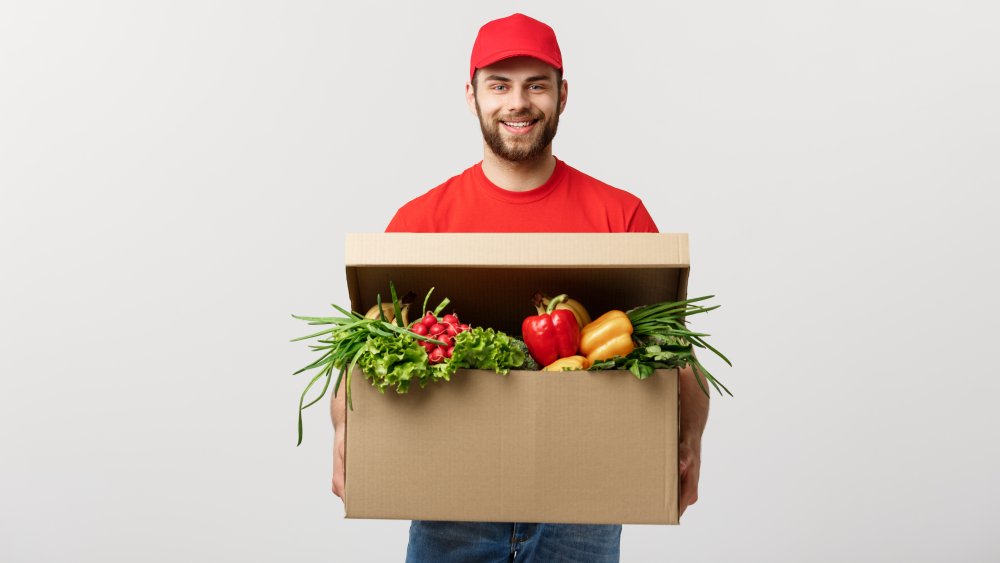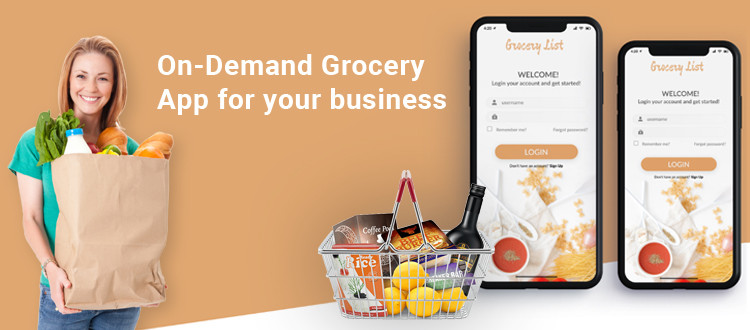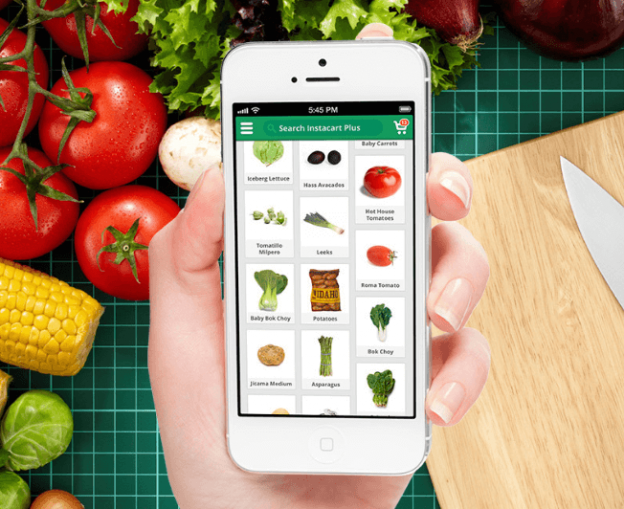
- Products
- Solutions
- Learn
- Partner
- Try Now
Grocery retail is constantly changing with the changing consumer behavior. Consumers today prefer to have their groceries delivered to their homes instead of going out to pick them up. In keeping with this trend, grocery delivery services are on the rise. Using the latest mobile technologies, startups are entering the grocery delivery market; even traditional brick-and-mortar stores are adapting to consumer demand and offering online delivery in addition to their existing business.
The grocery business has been one of the most reliable businesses, even during unprecedented times like covid. Amid a standstill, the grocery business thrived and grew exponentially.
The digitalization of traditional businesses gained momentum as people became more aware of social distancing. With the awareness of social distancing growing amongst people, traditional businesses are increasingly going digital. Companies started taking advantage of the latest technology and reaching out to customers to deliver products to their doorsteps. Delivery of groceries is one of the most popular businesses that grew during COVID.
How to start your grocery delivery business at a glance:
- Interesting trends in the grocery delivery business
- 4 significant challenges of a grocery delivery business
- Select a name for your online grocery delivery business
- Licensing and registeration
- 3 major business models and their revenue sources for your online grocery delivery business
- Build an application for your online grocery delivery business
- Must-have features for your grocery delivery app
- How to market your online grocery delivery business?
Interesting trends in the grocery delivery business
The present and future are looking for grocers and consumers. The online grocery delivery business is picking up as major players such as Amazon, Walmart, etc., enter the online market. Small and medium grocers now need to join the wave of digitalization to keep their customers satisfied. The demand for grocery delivery is growing as people settle and start families. Let’s look at some of the interesting trends in the grocery delivery business across the globe.
The USA has always been at the centre stage of all the development and innovations that have taken place in the world. The USA witnessed 3x growth in their online grocery delivery business compared to 2019. According to another report, 70% of grocery consumers in the USA will be ordering online by the end of 2022. The penetration of online grocery delivery is predicted to grow from 30% in 2019 to 60% in 2024-25.
When we observe Canada, it is much more of a laid-back market as compared to the USA. It is predicted that the online grocery delivery market in Toronto and Vancouver will grow from a $2 Bn industry to a whopping $4 Bn industry in the coming years. Considering the majority of the population in Canada is made up of millennials, the demand for online grocery is set to increase in the coming years as the in-store traffic decreases.
As for the UK, its demography has been hailed as the fastest habit-forming country in the world. With the lockdown imposed for the longest time compared to other countries, its population has grown fond of shopping online, which is bound to become the lifestyle; considering this new shopping behaviour among consumers, grocers have started to take their operations online.
4 significant challenges of a grocery delivery business

Storage:
Grocery items are perishable and need to be stored under refrigeration. This means either you need a warehouse, room, or van with refrigerated storage. This requires a considerable amount of capital upfront.
Low-profit margin:
Customers have a plethora of options these days, along with the reluctance to pay. With multiple companies offering great discounts on products, it leaves very little room for profits.
High Competiton:
The grocery business is one of the most popular businesses worldwide. It already has many big players, making it a competitive space for a new startup to acquire customers.
Delivery and Logistics:
With regular stores, delayed delivery, delivery of wrong items, or expired products can be managed, but for your online business, these issues can prove to be very problematic. Customers ordering online want their deliveries as soon as possible. This can be solved by hiring and training employees and having an intelligent delivery management system in a place like Tookan.
Selecting a name for your online grocery delivery business
The first step to building an online business is choosing the right name for your business that is easy to remember and has a good recall. Now, we understand that choosing a name can be a cumbersome process. Use a business name generator to create a name for your business and get a name that has a good recall.
Licensing and registration
In order to start your online grocery business, you need to get a trader license, learn and abide by the taxation norms of your region, and get a food license if applicable in the case of perishable products. The licenses and registrations might depend on your region, so do check it out with your local authorities or hire a legal advisor to cut through the hassle.
3 major business models and their revenue sources for your online grocery delivery business
There are three major business models that are widely popular in the grocery delivery business:
Inventory/ Storefront Model:
In the inventory/ storefront model, the owner of the platform sources and stocks up the groceries and other items from different vendors and delivers them to the customers using in-house or 3rd party delivery agents.
In simplest terms, it is an offline grocery store going online using website/ mobile applications with an option of home delivery service. Now, customers can order groceries online from you. You will deliver the groceries to your customers using either your in-house delivery agents or a 3rd party delivery service network.
You will earn from the order you receive from the customer and the delivery charge you can charge.
Multi-Vendor Marketplace Model:
The Multi-Vendor Marketplace Model is very similar to the UberEats model or Zomato model. This is one of the most preferred business models among grocery delivery start-ups. In this model, you don’t need to worry about inventory. You act as a middleman between the grocery store/vendor and the customer. You provide a website and/or a mobile application to place the order and grocery vendors to manage the orders, catalog, and inventory.
The customers will place an order on your website/ mobile app by selecting a vendor. It will assign the order to a delivery agent who will pick it up from the vendor and deliver it to the customer. The app will then transfer the order to the vendor once the vendor accepts the order.
This model allows you to earn through commission on orders, subscription for listing on the app, advertisement from the vendor, and delivery charges from the customer.
Shopping Model:
E-commerce grocery startups prefer this model. In this model, you, as the admin/owner of the platform, select the vendor who will fulfill the order, not the customer, as he did in the previous models.
When the customer places an order, the admin/owner of the platform selects the vendor who will fulfill the order. Once accepted, it is assigned to an in-house delivery agent who delivers to the customer. This is the same business model as Instacart.
Building an application for your online grocery delivery business

Once you’ve selected your business model, the next step is to develop your own grocery delivery app to cater to your customers. There are three modes of app development that are available in the industry:
- Custom Mobile app development: This model gives you total control over your app design and development. A custom-built app will allow you to stand out from the competition but will cost more since you’ll have to bear the cost of the resources to design, develop and test. Another con of custom mobile app development is that it takes more time to create an app from scratch than getting a readymade app or a SaaS-based solution.
- Ready-Made app development: Another option is to get a ready-made app from a development company. As the name suggests, it is a prebuilt app on which you do some minor modifications and turn it into your app. All you need to do is to find a company with a product that has all the features that you require in your application. The development company will then modify and rebrand it with your name and logo. Though this is a cheaper option as compared to building a custom mobile application, you might have to compromise on UI/ UX, and adding new features can too be a challenging task.
- SaaS-based solution: A pre-built set of mobile apps offered as a subscription service and rebranded to your company’s name. This is the fastest, cheapest, and most popular way to market. Though a SaaS-based solution does not provide you with total control over the platform, generally, these solutions are feature-rich and provide you with regular updates to stay on top of the market.
Yelo by JungleWorks, a SaaS-based order management solution, is one of the most sought-after entrepreneurs. They want to get started with a robust and feature-rich platform without making a huge upfront investment in technology. Here are the top 9 reasons why your grocery business needs a white-label solution
Must-have features for your grocery delivery app

To be successful in the grocery delivery business, your grocery delivery app should provide the best experience to your customers. To achieve this, your app should be up to date with the latest technology, have the latest features, and have an intuitive UI so that your customers can use the app easily.
Some of the top features for an on-demand grocery delivery customer app are:
- Product Search
- Filter
- Online payment
- Customer wallet
- Omnichannel social login
Check out the top 16 features for an on-demand grocery delivery app that you need to become successful.
How to market your online grocery delivery business?
Acquiring customers
- Social Media: In today’s world, almost everyone uses social media, so creating a brand and following on social media platforms like Facebook and Instagram will help your brand grow organically and get more customers.
- PPC Ads: App download campaigns can help you gain more app downloads and customers whereas engagement and reach campaigns can help you get more reach and engagement among your customers on different platforms.
- QR Code for app download: You can place QR codes that direct users to your app, where they can download it and place orders.
- Promo Codes: People love discounts, and good discounts attract new customers. But before applying this technique make sure the ordering experience is remarkable to retain those customers.
- Email marketing: Email marketing is one of the cheapest and most effective ways to acquire customers. According to research, 54% of people positively towards companies that send out email updates.
Acquiring vendors
- Physical Onboarding: You can visit the vendor, introduce your application, and onboard them.
- Run PPC campaigns: You can run online campaigns to get more inquiries from vendors who are interested in your application.
JungleWorks’ Grocery Suite
We offer a complete package that includes order management powered by Yelo, delivery management powered by Tookan, and Customer support and marketing powered by Hippo.
Jungleworks has empowered 1000s of entrepreneurs to achieve their dream of taking their business online. You can be next in line to fulfill your dreams of having an online store or marketplace. Don’t miss this opportunity of creating generational wealth.
Subscribe to stay ahead with the latest updates and entrepreneurial insights!

Subscribe to our newsletter
Get access to the latest industry & product insights.























